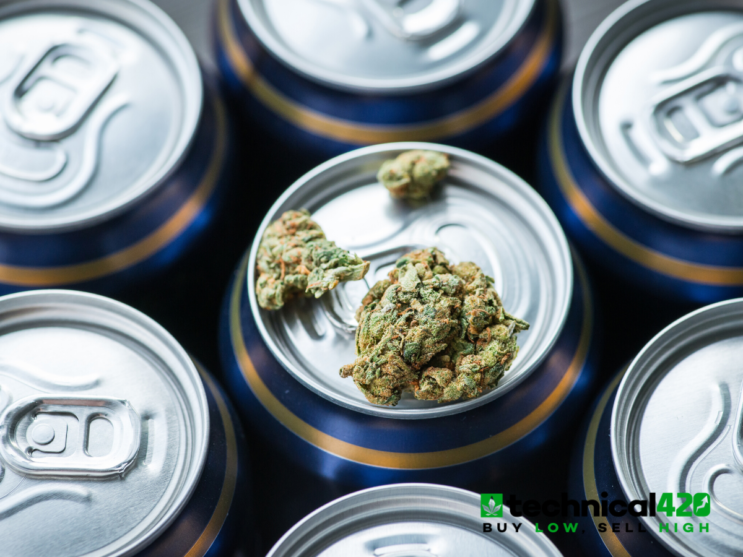Cannabis is on a roll. Despite legality issues across various states, the zeitgeist appears to be changing on marijuana as a therapeutic substance. Several states, most recently New Jersey, have voted to legalize cannabis for recreational use, paving the way for private enterprise to enter the industry. While many states still have strict rules or allow use only with a prescription, the foundation has been set for a rollback of cannabis’s status as a controlled substance.
Of course, many of these enterprises have aspirations far beyond merely growing and selling. While smoking and vaping are still thought to be the primary methods of consumption, edibles have always been popular and now a new product has the possibility to surpass them all — drinkables.
Industry Overview
Despite strict federal regulations in the United States, the cannabis industry is thriving. Most of the hot cannabis stocks you’ll see listed in ETF holdings are Canadian-based firms, where federal laws about the plant are far less draconian. While most of these firms qualify as small or mid-cap stocks, some have experienced tremendous growth, like Canopy Growth Corp. (NSDQ: CGC), which has a market cap just under $10 billion.
Cannabis is legal for medical use in 35 states in the U.S. Additionally, recreational use is legal in 16 of those 35, although many states like New Jersey have nebulous guidelines about who can purchase it and where it can be sold. However, federal attitudes are beginning to change as well. Attorney General William Barr never went after cannabis companies operating in states where the substance was legal and President-elect Joe Biden is expected to further reduce the friction between pot companies and federal authorities.
Despite these promising headwinds, cannabis remains banned at the federal level everywhere but Canada. Significant regulatory and legal hurdles will need to be jumped for any cannabis or cannabis beverage maker to become a safe, profitable investment. Investing in the cannabis industry isn’t for the faint of heart, especially when your focus is something as new and innovative as cannabis beverages.
Types of Cannabis Beverages
So how does cannabis wind up in a drink? There are two schools of thought and both revolve around the two different chemicals cannabis producers are interested in tetrahydrocannabinol (THC) and cannabidiol (CBD). These two chemicals can be infused in foods like cookies, brownies, gummy bears, and other sweets, but also into beverages for both relaxation and pleasure.
THC is the active ingredient in cannabis. When users smoke or ingest marijuana, this is the specific chemical that gets them high. THC has a psychoactive effect on the brain, which is the main reason why marijuana is a controlled substance at the US federal level (with a little additional help from William Randolph Hurst who wanted to protect his paper-producing industry from the hemp trade, but that’s a story for another day).
The other chemical cannabis companies are interested in is CBD, which does NOT have psychoactive properties and does have some uses recognized by the FDA, such as the anti-seizure drug Epidiolex. However, despite common misperceptions, CBD has not been approved for medical use in other facets by the FDA and anyone claiming to sell products with CBD as therapeutics are at risk of facing legal action. To be sold legally in the United States, CBD must fit the legal definition of hemp (less than 0.3% THC) and must comply with the rules of the Federal Food, Drug, and Cosmetics Act (FD&C). Basically, you can’t sell CBD as a therapeutic or dietary supplement, but it can be used in cosmetics in certain situations.
THC-infused beverages are intended to get the consumer high, which will actually make them easier to regulate and sell. Some CBD-infused beverages plan to market themselves as therapeutics though, which could find them in the crosshairs of the FDA.
Companies to Watch Out For in the Cannabis Beverage Sector
Many different firms from several sectors are looking to get their hands into the proverbial cannabis cookie jar. On one hand, you have the cannabis producers and growers who are looking to add marijuana into an increasing number of consumables. And then you have the entrenched food and beverage companies who want to add cannabis-infused items to their product line. In some cases, growers and beverage producers even work side-by-side. Here are a few publicly-traded companies to keep an eye on in the cannabis beverage sector.
Constellation Brands (NYSE: STZ)
Constellation is one of the largest beverage producers on the planet with over 8,000 employees and an annual revenue north of $8 billion. Some of the company’s most popular brands include beers like Corona, Modelo, and Pacifico and wines like Robert Mondavi, Charles Smith, and Kim Crawford. They also own nearly 40% of Canopy Growth Corp (NSDQ: CGC) and have been working on cannabis-infused beverages for release in Canada (and the United States when federal regulations are inevitably relaxed).
Canopy Growth Corporation (NSDQ: CGC)
If you’re going to invest in Constellation Brands for their cannabis beverages, Canopy is also worth a look since they’re one of the purest plays available in the marijuana industry. With a market cap over $8 billion and trailing twelve month profits totaling over $100 million, Canopy has the best of both worlds – a solid base of growing and supplying cannabis and a firm enough balance sheet to withstand regulatory delays and legal challenges. Plus, having a financier like Constellation is a nice fall-back crutch.
Heineken N.V. (HEIS.AS)
You can probably guess which brand of beer Heineken sells. But you may not know the Dutch beverage maker is also behind Amstel, Lagunitas, Sol, and Strongbow Cider. Being based in Amsterdam is just too good to be true for a firm entering the cannabis beverage space and Heineken threw their hat into the ring. Beer drinkers might recognize the Lagunitas Hi-Fi Hops variety, which is an IPA infused with both hops and THC, the active ingredient in cannabis.
Ambev S.A. (NYSE: ABEV)
More commonly recognized as Anheusier-Busch in the United State, Ambev is a huge multinational beverage conglomerate responsible for not just the Budweiser brand, but also Stella Artois, Michelob, Labatt, Beck’s, and Hoegaarden. The company recently announced a joint venture with Tilray Inc to investigate the use of both THC and CBD into adult beverages. Tilray and Ambev contributed $100 million combined to the venture, which right now is only looking at distribution in Canada due to it’s clear legal status at the national level.









 Get the Latest Cannabis News & Stock Picks.
Get the Latest Cannabis News & Stock Picks.
Comments